Property Division in Quebec
You are looking to get married and wonder how your marriage can impact the property you owned prior to the marriage?
You are married and want to better understand your rights and obligations with regards to the assets you acquired during your marriage.
Perhaps you are in a divorce, legal separation or dissolution of civil union case and you are looking to understand the consequences of your separation on the property you owned with your spouse.
In this article, you will learn and understand your responsibility towards family assets and debts along with how your property will be divided upon separation.
You will then be better equipped to make more informed decisions in handling your assets and property division in Quebec.
- Property owned prior to marriage
- Value of property owned prior to marriage
- Revenue from property owned prior to marriage
- Property acquired after marriage
- Family patrimony
- Family patrimony assets
- Ownership of family patrimony assets
- Modifying application terms of the family patrimony
- Exemption to the rules of the family patrimony
- Matrimonial regimes
- Partnership of acquests
- Property considered an acquest
- Property considered as private
- Division of assets under the partnership of acquests regime
- Dissolution and liquidation of the partnership of acquests
- Separation as to property
- Community regime
- Marriage contracts
- Selecting matrimonial regime
- Agreeing on asset division
- Protection of the family residence
- Consent of spouses needed
- Declaration of family residence
- Conclusion on Property Division in Quebec
Property owned prior to marriage
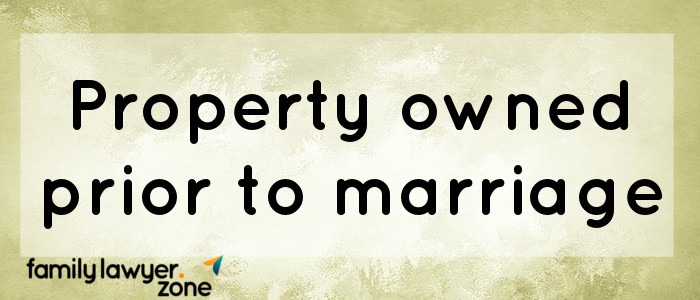
Generally speaking, the assets and property you acquired prior to your marriage will not be subject to partition in the context of a divorce, legal separation or dissolution of civil union.
As a result, if you brought $200,000 in property into the marriage, then upon separation, you can claim back your $200,000 along with any value appreciate.
Value of property owned prior to marriage
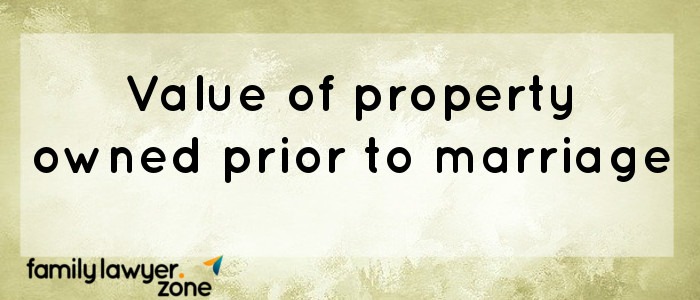
Some couples may find it useful to do an inventory of their assets and liabilities prior to getting married so that it is clear what property or debt was brought into the marriage by each spouse along with their respective values.
This inventory may be done in the context of a marriage contract where the couple can also select the matrimonial regime applicable upon separation as we will discuss further in this article.
In essence, the property that you bring into the marriage along with its value appreciation or depreciation will be attributed to you upon separation.
Revenue from property owned prior to marriage

One important legal implication affecting the property you owned prior to marriage is the revenue generated by such property.
If you are subject to the matrimonial regime of partnership of acquests, the revenue generated by your assets, whether from prior to marriage or after, will be considered as “fruits of the marriage” and thus be subject to partition.
In fact, article 449 of the Civil Code of Quebec states:
The acquests of each spouse include all property not declared to be private property by law, and, in particular,
(1) the proceeds of that spouse’s work during the regime;
(2) the fruits and income due or collected from all that spouse’s private property or acquests during the regime.
In other words, the income generated by all your properties, whether acquired prior or after your marriage will be considered an acquest, which means that it will be subject to division upon separation.
Property acquired after marriage
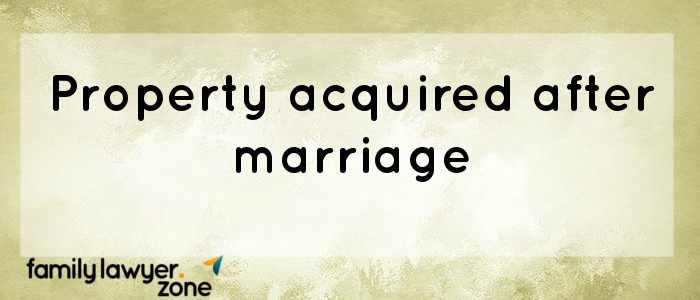
The first principle outlined in law is that both spouses will take in hand the material direction of the family.
This means that both spouses are given a legal duty to participate in the economic and material decisions of the family and ultimately acquire rights in them as well.
The law further creates a legal tie between the spouses by stating that both spouses are responsible for any expenses and debts related to the current needs of the family.
This is significant as one spouse may incur expenses and automatically bind the other without the other’s express consent.
Family patrimony
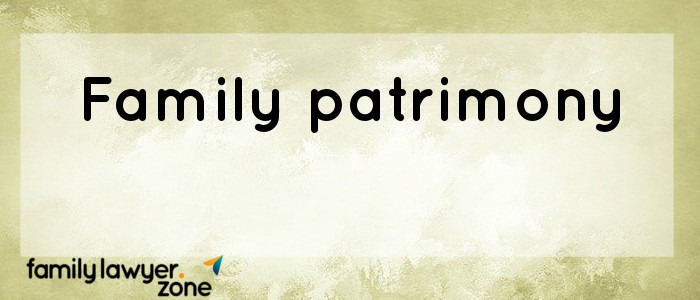
When you get married, your assets and property will get divided into two pools:
1- family patrimony assets
2- matrimonial regime assets
Family patrimony assets

The family patrimony assets are composed of very specific assets that a married couple may acquire during their union.
These assets are composed of the following:
1- the family residence
2- furniture and movable goods garnishing the family residence
3- secondary residence
4- furniture and movable goods garnishing the secondary residence
5- motor vehicles used by the family
6- registered retirement savings plans or RRSP’s
7- pension plans
8- QPP or CPP
Ownership of family patrimony assets

One particularity of the family patrimony assets is that regardless of ownership, both spouses are entitled to half of the net value of these assets.
For example, imagine that your house is in your spouse’s name, along with the car and all of the RRSP’s, and you do not have anything in your name.
Under the rules of the family patrimony, if the total net value of the house, car and RRSP is worth $200,000, then you will be entitled to $100,000 even though you do not own these assets.
This is a special protection given to the spouses so that both spouses are treated equally at least when dividing the assets of the family patrimony regardless of their economic power and position in the family.
All other assets that you may own with your spouse that goes beyond those contained in the family patrimony pool will be subject to the partition rules as dictated by the matrimonial regime applicable to your marriage and as we will see later in this article.
Modifying application terms of the family patrimony

The law makes it clear that the family patrimony regime is of public order.
In other words, the spouses are not permitted to modify the terms of the family patrimony regime through a contract or other form of agreements.
As a result, even in the case where you mutually agree on how to divide assets subject to the rules of the family patrimony prior to the filing of a formal divorce application, that agreement will not be valid in law and will not produce any legal effects.
On the other hand, when the right to the family patrimony materializes with the filing of a divorce application, then you can mutually agree on how to divide these assets, subject to the final approval of the court.
Exemption to the rules of the family patrimony
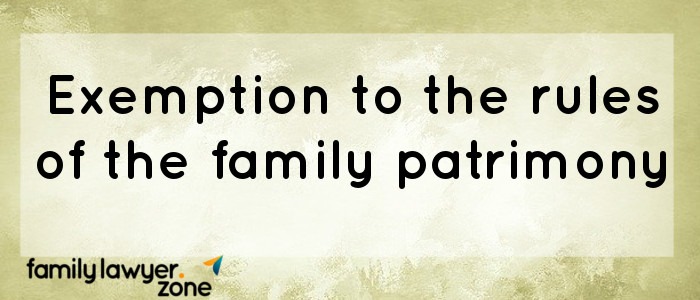
In very exceptional cases, upon request, the court may accept to provide the spouses with an exemption to the application of the rules of the family patrimony.
For instance, if your marriage lasted only a few months, then due to the brevity of your marriage, the court can exempt you from having to divide your family patrimony assets.
This is a fair position as you did not have any chance to invest in mutually developing your assets and so it makes sense that you and your spouse take back the assets you each brought into this very short marriage.
Matrimonial regimes
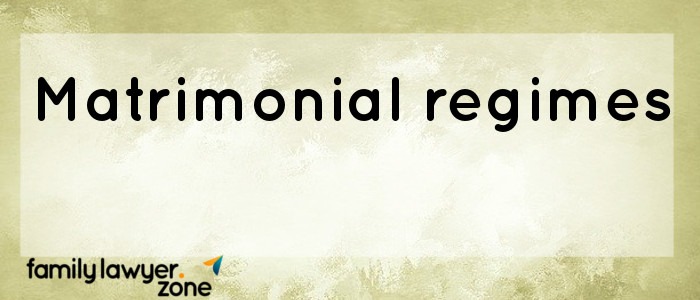
In Quebec, upon marriage, your assets will be categorized in two different pools.
The first pool is the family patrimony assets and the second pool is the matrimonial regime assets.
There are a few matrimonial regimes that can apply to you depending on whether you were married prior to July 1, 1970 or if you have a marriage contract.
We will cover the three different regimes potentially applicable to you in the following paragraphs.
The three different matrimonial regimes that may be applicable to you under the Quebec laws are:
1- partnership of acquests
2- separation as to property
3- community regime
Partnership of acquests

The first regime that may be applicable to you and also the most commonly applied regime is that of the partnership of acquests.
This is also the matrimonial regime applicable to you by default if you were married on or after July 1, 1970.
The only way that you could change this regime is by signing a notarial marriage contract whereby you and your spouse agree on the application of another regime in the event of a separation.
When the matrimonial regime is applied by the effect of the law, we refer to this as the “legal matrimonial regime”.
If the matrimonial regime is mutually agreed in a marriage contract, we will refer to this as a “conventional matrimonial regime”.
Property considered an acquest

Under the matrimonial regime of partnership of acquests, your property is divided in two categories:
1- acquests, and
2- private property
Article 449 of the Civil Code of Quebec states that:
The acquests of each spouse include all property not declared to be private property by law, and, in particular,
(1) the proceeds of that spouse’s work during the regime;
(2) the fruits and income due or collected from all that spouse’s private property or acquests during the regime.
So to identify the property you own qualifies as an acquest, you should simply identify what is considered as private and qualify all else as an acquest.
If you have a property that does not fall into the definition of a private property, then it’s an acquest.
If you are unable to prove that a property is private, then it’s deemed to be an acquest.
Finally, all property is presumed to be an acquest unless you are able to prove that it’s a private property.
Property considered as private
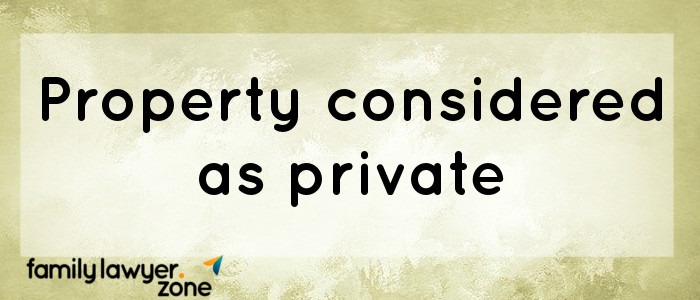
The law qualifies very specific types of property as private property under the matrimonial regime of partnership of acquests.
So the rule is that if you can specifically prove that a property is private, then it will be considered private.
If you are unable to prove that a property is private, then it will be presumed to be an acquest.
Article 450 of the Civil Code of Quebec defines a private property as:
The private property of each spouse consists of
(1) property owned or possessed by that spouse when the regime comes into effect;
(2) property which devolves to that spouse during the regime by succession or gift, and the fruits and income derived from it if the testator or donor has so provided;
(3) property acquired by that spouse to replace private property and any insurance indemnity relating thereto;
(4) the rights or benefits devolved to that spouse as a subrogated holder or as a specified beneficiary under a contract or plan of retirement, other annuity or insurance of persons;
(5) that spouse’s clothing and personal papers, wedding ring, decorations and diplomas;
(6) the instruments required for that spouse’s occupation, saving compensation where applicable.
The definition of private property is pretty straightforward.
Property you owned prior to the marriage, what you purchased using your private property, gifts or inheritances are considered private property.
Also, your wedding ring is considered a private property along with your clothing, decorations and diplomas.
The property you use as part of your occupation to earn a living is also a private property as defined under the law.
The law considers other types of assets as private, such as the right to claim damages, compensation received resulting from moral or bodily injury or disability pension are considered private property.
Division of assets under the partnership of acquests regime
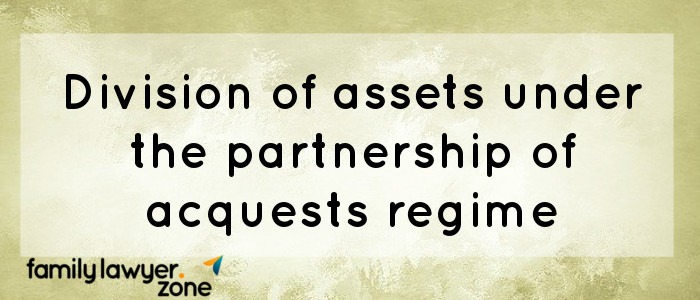
Once you have identified your private property, then the remaining property will be considered an acquest.
So how do we divide private property and acquests?
As for the private property, each spouse will retain his or her rights on the private property.
As for the acquests, a spouse may accept or renounce the partition of the acquests regardless of any agreement to the contrary.
The acceptance or renunciation is irrevocable and can only be annulled on the basis of lesion or your consent being vitiated.
Dissolution and liquidation of the partnership of acquests

The dissolution and liquidation of the matrimonial regime of partnership of acquests is materialized by any of the following events defined by law:
- the death of one of the spouses;
- a conventional change of regime during the marriage;
- a judgment of divorce, separation from bed and board, or separation as to property;
- the absence of one of the spouses in the cases provided for by law;
- the nullity of the marriage if, nevertheless, the marriage produces effects.
In essence, by filing a divorce application, legal separation or nullity of marriage application, the right to the dissolution of the regime materializes as of the date you filed for application.
In the other cases, the effects of the dissolution will be immediate such as in the event of death, absence of a spouse or change in matrimonial regime.
Separation as to property
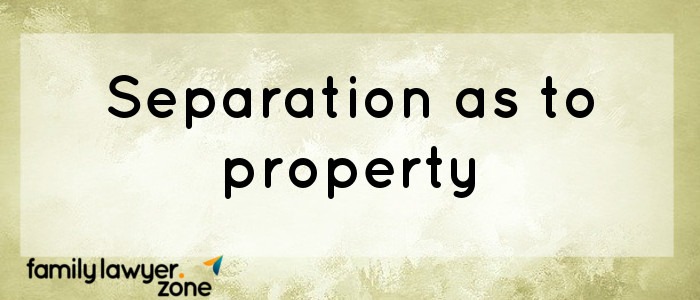
The second matrimonial regime under the Quebec law is the separation as to property.
This regime is a “conventional regime” as the only way you can be subject to this regime is through a marriage contract.
Under this regime, each spouse will have the full right and has the administration enjoyment of his or her property.
If you own a property that you are unable to definitively prove the ownership, then it is presumed to be jointly owned by each spouse.
Community regime

The community regime is the third and final matrimonial regime that can apply and the least common.
In fact, this regime used to be the default legal regime if you were married prior to July 1, 1970.
Marriage contracts

The law allows you to enter into a marriage contract to select the matrimonial regime of your choosing.
The typical matrimonial regime selected under a marriage contract is that of separation as to property.
For the marriage contract to be valid, you must respect certain formalities failure of which the law will not recognize your marriage contract.
Article 440 of the Civil Code of Quebec requires that all marriage contracts be notarized.
All agreements that do not respect this condition will be declared null and void.
Once the marriage contract is signed, the notary must also enter the same in the register of personal and movable real rights.
These formalities are crucial for the marriage contract to acquire legally binding effects.
Selecting matrimonial regime
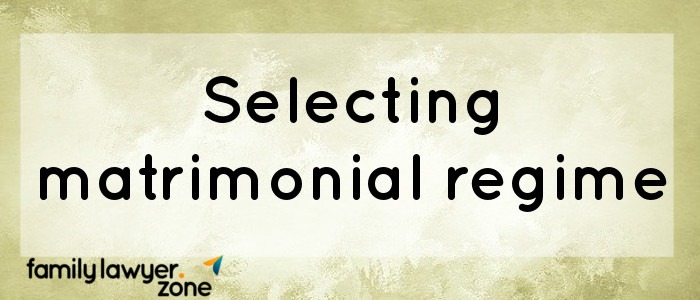
The goal of the marriage contract is in part to change select the matrimonial regime applicable to you in case of separation or divorce.
If you make a selection in the marriage contract, then that matrimonial regime will apply.
If you do not make a selection, then the default matrimonial regime of partnership of acquests will continue to apply to you.
Generally, when spouses enter into a marriage contract, they set their matrimonial regime to be that of separation as to property.
In this manner, upon separation, each spouse will keep all property in his or her name.
Agreeing on asset division

In your marriage contract, you can also mutually agree on the division of your assets provided that you do not go against rules and legal conditions that are of public order.
In other words, the rules of the family patrimony is of public order and will supersede all contracts or agreements of the parties even if it was done in good faith.
Protection of the family residence

The family residence is given special protection under the law.
The family residence is the place where the married couple called “home” and conducted their main family matters and activities.
If you have many properties, it’s important to qualify your main residence as the family residence as you can get the protection of the law for only one residence, your family residence.
Consent of spouses needed

First, the law states that neither spouse can remove the furniture and the movable goods garnishing the family residence without the consent of the other.
If your family residence is rented, then the Quebec laws state that even if the lease is solely in your spouse’s name, he or she cannot transfer, sublet or assign the lease without your consent.
If the family residence is owned by one or the other spouse, neither spouse can sell or mortgage the property without the consent of the other.
Declaration of family residence
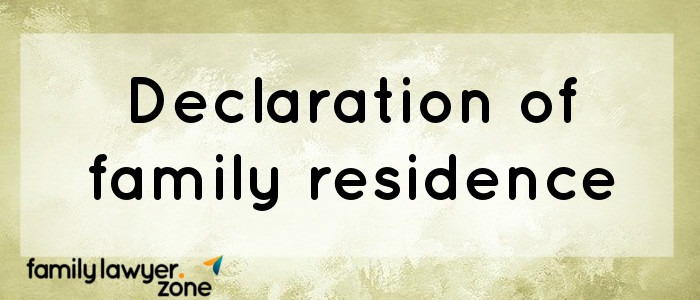
To ensure that the public is made aware that your house is protected by the laws related to the family residence, you can have your lawyer or notary publish a declaration of the family residence on the property.
This declaration of family residence will signal to the public, the banks, buyers and others that if you intend to sell or mortgage the property, your consent will be required and ultimately you will need provide a discharge of the declaration in question.
Conclusion on Property Division in Quebec
We hope that this article was useful for you to get acquainted with the rules of the family patrimony and better understand the matrimonial regimes applicable in the Province of Quebec.
This article was intended to paint a broad portrait of the legal landscape when dealing with the division of assets under the Quebec laws.
However, there are more details and technicalities that can impact your specific case and when dealing with different types of properties, it may be worth it to consult with an experienced family lawyer who can provide you additional guidance and support.
At our law firm, we have decades of experience and knowledge in the practice of family law and fully understand the intricate details and subtleties of a case.
If you wish to have a consultation with a lawyer or mandate one for legal representation with respect to the Quebec laws and the partition of assets, we are happy to be able to assist you.
Good luck in your family law case.
FamilyLawyer.Zone





